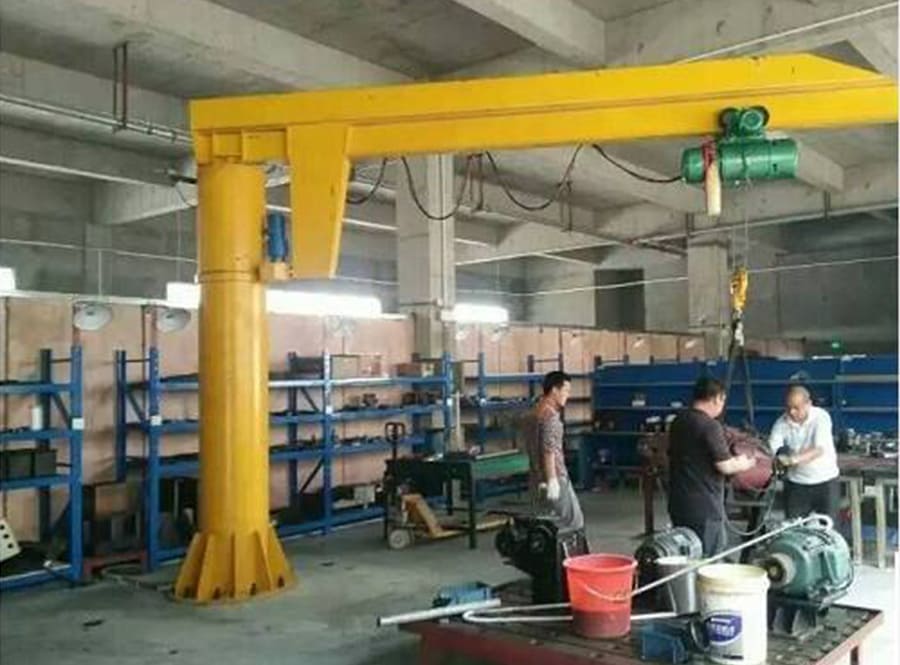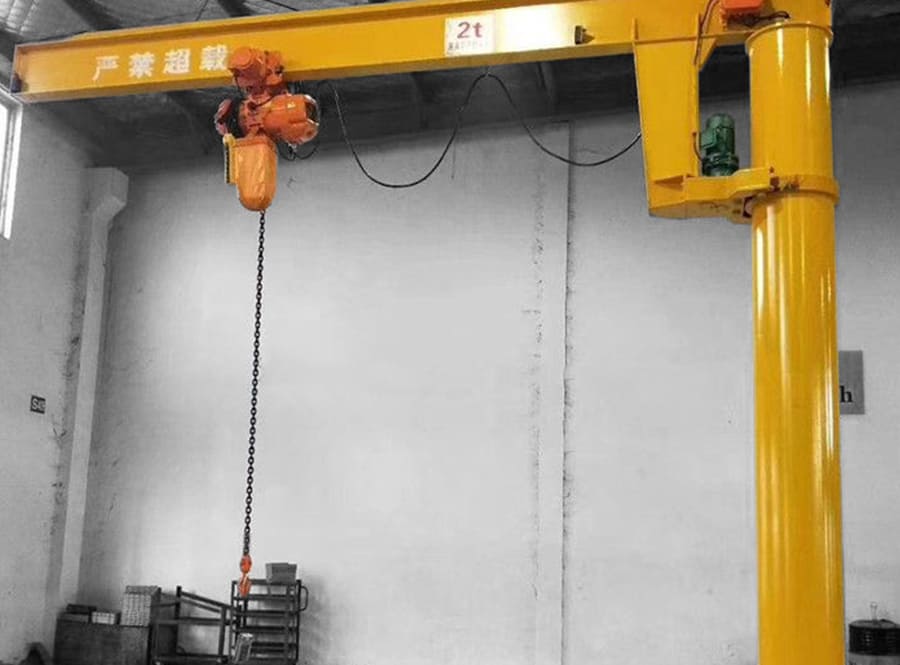V sodobnem industrijskem in gradbenem sektorju je dvižna oprema nujna in Jib Crane je zaradi svoje prilagodljivosti, učinkovitosti in vsestranskosti postal priljubljen kot običajna dvižna rešitev. Ta članek bo raziskal načelo delovanja, prednosti in uporabo žerjavov s krakom v različnih panogah.
Načelo delovanja:
Jib Crane ima zasnovo s konzolno roko kraka, pri čemer je en konec pritrjen na steber ali steno, drugi konec pa obešen. Roka je opremljena z dvižnim mehanizmom, običajno električnim ali hidravličnim žerjavom. Z uporabo funkcij dviganja in obračanja žerjava lahko žerjav na strehi izvaja navpično in vodoravno dviganje, spuščanje in premikanje materiala.

Prednosti:
Prilagodljivost: Konzolna zasnova žerjava Jib Crane zagotavlja odlično prilagodljivost. Deluje lahko v zaprtih prostorih in ga ne omejujejo talne ovire, zaradi česar je idealna izbira za dviganje na omejenih delovnih območjih.
Učinkovitost: žerjav na strehi ponuja hitro in učinkovito dviganje. Njegovo navpično gibanje omogoča hitro premeščanje materiala, kar povečuje produktivnost. Poleg tega dvižne in obračalne funkcije žerjava Jib Crane olajšajo natančno pozicioniranje in rokovanje s predmeti.
Vsestranskost: Žerjavi s krakom so lahko opremljeni z različnimi priključki in orodji za izpolnjevanje različnih industrijskih zahtev. Na primer, različne vrste kavljev, sponk in magnetov je mogoče namestiti za namestitev predmetov različnih oblik in velikosti. Ta vsestranskost omogoča Jib Cranes uporabo v proizvodnji, skladiščenju, logistiki in na gradbiščih.
Aplikacije:
Proizvodnja: Žerjavi na strehi se uporabljajo za nakladanje/razkladanje blaga, sestavljanje komponent in vzdrževanje strojev v proizvodnih obratih. Njihova sposobnost premikanja znotraj tovarniških delavnic izboljšuje učinkovitost proizvodnje in zmanjšuje potrebe po delovni sili.
Pristanišča in logistika: Žerjavi na strehi se uporabljajo za pretovarjanje zabojnikov, zlaganje tovora in naloge sortiranja v pristaniščih in logističnih centrih. Njihova učinkovitost in vsestranskost pospešujeta logistične operacije ter zagotavljata hitrejše in varnejše ravnanje z materialom.
Gradbišča: Žerjavi na strehi igrajo ključno vlogo na gradbiščih, saj olajšajo dvigovanje gradbenih materialov, namestitev jeklenih nosilcev in montažnih komponent. Njihova prilagodljivost in učinkovitost poenostavljata materialno logistiko na gradbiščih.
Rudarstvo in težka industrija: V rudarstvu in težki industriji se žerjavi s prestavo uporabljajo za dvigovanje in transport težkih predmetov, kot so rude, jeklo in strojna oprema. Njihova robustna dvižna zmogljivost in stabilnost zagotavljata varno in učinkovito rokovanje z velikimi predmeti.

Zaključek:
Žerjavi s prestavo so zaradi svoje fleksibilnosti, učinkovitosti in vsestranskosti postali nepogrešljiva dvižna oprema v sodobni industriji in gradbeništvu. Ne glede na to, ali gre za proizvodnjo, logistiko, gradbišča ali težke industrije, imajo žerjavi ključno vlogo. Z nenehnim tehnološkim napredkom se bodo žerjavi na strehi še naprej razvijali in izboljševali, da bodo izpolnjevali spreminjajoče se zahteve ter zagotavljali učinkovitejše in varnejše rešitve za dviganje v različnih panogah.
